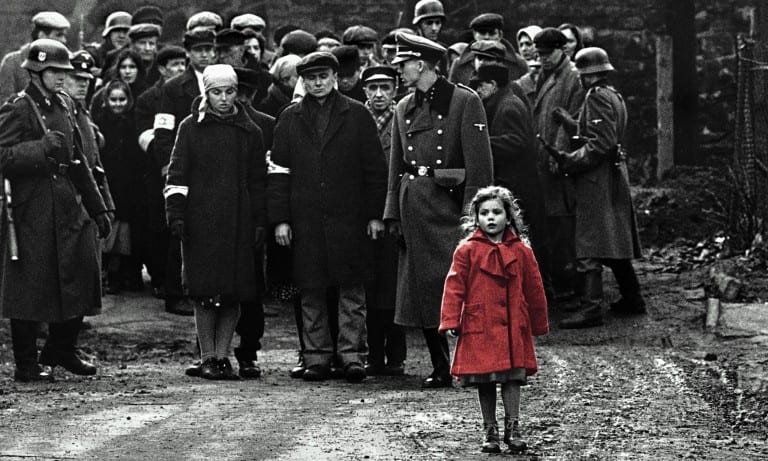by The Cowl Editor on November 1, 2018
Arts & Entertainment
by: William Burleigh ’19 A&E Staff

Dr. Raymond Sickinger’s “History of Nazi Germany” seminar at Providence College recently screened Schindler’s List (1993), an epic historical drama that tells the true story of Oskar Schindler, a German businessman who saved the lives of more than 1,000 Jewish refugees from the Holocaust by employing them in his factories during World War II. The film stars Liam Neeson as Schindler and Ben Kingsley as Schindler’s Jewish accountant, Itzhak Stern. Ralph Fiennes also appears, in one of his career-best performances, as the cruel SS officer Amon Göth.
Schindler’s List was directed by Steven Spielberg, an Orthodox Jew whose resolve to make the film became complete when studio executives asked him why he did not simply make a donation of some sort instead of wasting the studio’s time and money on a depressing film.
Spielberg brought all of his directorial talent to Schindler’s List, which is considered to be one of his best. Spielberg shot the film with the same approach as a documentary film, relying heavily on hand-held camera techniques to evoke the quality of newsreel footage. Additionally, Spielberg decided to shoot the film entirely in black and white (except for the iconic image of a young girl in a red dress and a poignant epilogue scene involving the real-life “Schindler Jews” visiting Oskar Schindler’s grave) to create a sense of historical and emotional authenticity.
Several other aspects of Spielberg’s direction are noteworthy. While he was granted permission to film inside the Auschwitz concentration camp, he chose not to out of respective for the victims who died there, and instead built a set that mirrored the camp’s exact looks in order to film there.
Spielberg insisted that all royalties and residuals owed to him for his work on the film be instead given to the Shoah Foundation, which records and preserves testimonies of survivors of genocide worldwide, many of which are from the Holocaust. He also refuses to autograph any materials related to Schindler’s List.
When it was released 25 years ago on December 15, 1993, Schindler’s List was a box office success, grossing $321 million worldwide on a $22 million budget. It was also critically acclaimed and won seven Academy Awards (out of 12 nominations), including Best Picture, Best Director, Best Adapted Screenplay, and Best Original Score, as well as numerous other awards. In the years since, Schindler’s List has come to be regarded as one of the greatest movies of all time. It ranks seventh on IMDb’s Top 250 Rated Movies and boasts a rating of 93 on Metacritic.
The true significance of Schindler’s List, though, lies not in its box-office grosses and Academy Awards, but in its enduring cultural relevance as a reminder that the evil of anti-Semitism, while very present in our world, can be overcome with unity and courage. By painting one of the most tragic events in world history as a deeply emotional and profound portrait that inextricably links the devastation of Nazism with the beauty of Jewish hope, Schindler’s List cements itself as a timelessly powerful piece of cinema which proves that love can, and must, conquer hate. Above all else, Schindler’s List is significant because it never lets the bleakness of the Holocaust overwhelm its important theme of fighting for the common good, reflected best in one of the film’s final quotes, “He who saves the life of one man saves the world entire.”In 2018, Schindler’s List’s additional themes of equality, religious freedom, and fighting back against hate and injustice are still manifestly important. Unfortunately, these messages require constant reiteration, as evidenced by recent acts of anti-Semitism in the United States.
Last weekend, on Oct. 27, a mass shooting took place in a Jewish synagogue in Pittsburgh, Pennsylvania. A gunman armed with an AR-15 assault rifle and at least three handguns entered the synagogue during a service, yelled, “All Jews must die!” and opened fire. He killed 11 people and wounded six others.
As the shooter was taken into custody, he told authorities, “They’re committing genocide to my people. I just want to kill Jews.” The shooter frequently posted anti-Semitic threats and white nationalistic sentiments online. Federal authorities have filed 29 criminal charges against him, including 11 counts of obstructing the exercise of religious beliefs resulting in death.
This horrific hate crime, which is believed to be the single deadliest attack on the Jewish community in U.S. history, sheds light on the anti-Semitic rhetoric that plagues our country.
The U.S. Anti-Defamation League (ADL) reported nearly 2,000 cases of harassment, vandalism, and physical assault targeting Jewish people in 2017—a 57 percent increase from 2016. This was the largest single-year increase since the ADL first began tracking such data in 1979, and marked the highest number of anti-Semitic incidents on record since 1994. Additionally, last week, researchers with the ADL found a significant increase in online attacks targeting Jewish politicians, journalists, and others in the lead-up to next week’s midterm elections.
While it is indescribably tragic that the same anti-Semitic attitudes present in Schindler’s List are still held by any person, much less many, in 2018, that is the disturbing reality of the world today.
But it is a reality that must be changed. Anti-Semitism and other hateful rhetoric towards any minority group deserve no place in this country, or anywhere else in the world. No Jewish person should ever have to fear for their safety in any location, least of all in their place of worship. Ultimately, violent crimes of bigotry and hate, still present in our world even so long after the Holocaust, can be eradicated only through the hopeful, resilient fight for the acceptance of all people – a fight that must be ongoing until there is justice in this world.
Comments are closed.
Very fine article. It is amazing how hatred and fear cause such sorrow, but love and compassion lead to life.